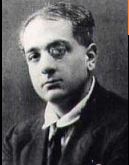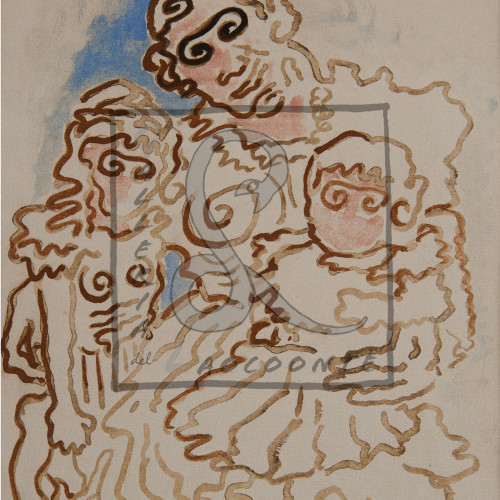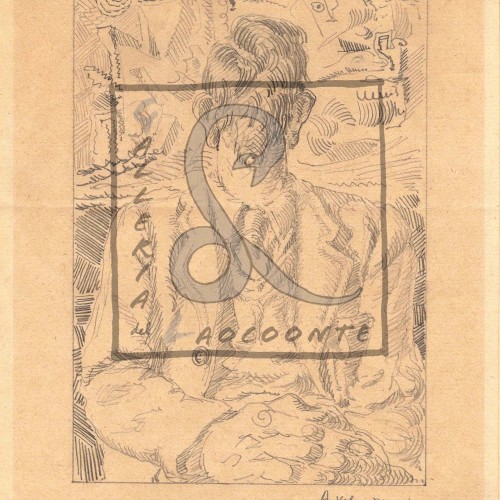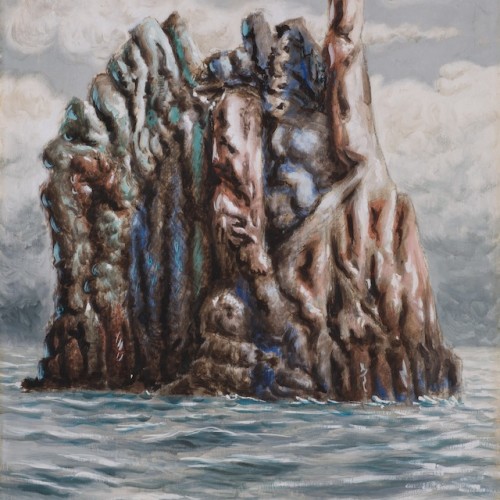 Alberto Savinio, also known as Andrea Francesco Alberto de Chirico, was born in Athens on 25th August, 1891. He was the third son of Evaristo de Chirico, railway engineer and brother of Giogio de Chirico. As a child he studied piano and composition at the Conservatoire of Athens, from which he graduated in 1903. Following the death of his father in 1905, his family moved to Monaco di Baviera. After complete failure with his early compositions, in 1911 he moved to Paris where he came into contact with personalities such as Pablo Picasso, Blaise Cendrars, Francis Picabia, Jaen Cocteau, Max Jacob and Guillaume Apollinaire. In 1914, he published ‘Les Chants de la mi-mort’ for the magazine ‘Les Soirees de Paris’, going by the pseudonym of Alberto Savinio for the first time. In 1915 he returned to Italy and, along with his brother Georgio, was enlisted in the 27th Infantry Regiment in Ferrara, before being transferred to Thessaloniki as an interpreter. In 1923 he moved to Rome where he was among the founders of the ‘Compagnia del Teatro dell’Arte’, directed by Luigi Pirandello and for which he wrote, but did not stage, Captain Ulysses. After marrying Maria Morino, who bore him two sons, and after another brief stay in Paris, where he dedicated himself particularly to painting, he settled in Rome in 1934. Whilst in Rome he collaborated with ‘La Stampa’ and other magazines such as ‘Colonna’ and ‘il Bolletto’. In 1938 André Breton published ‘Anthologie de l’humor noir’ in which he spoke about Alberto Savinio, notably the only Italian featured in the publication. Perhaps because of a piece of satire on Leopardi (il sorbetto di Leopardi), published in 1939 in the weekly Omnibus of Leo Longanesi, which brought him hostility from the fascist regime, he was forced into hiding in 1943 having learned that his name was on a list of suspected anti-fascists. After the war he continued to critique cultural offerings in the columns of the ‘Corriere della Sera’, winning the Saint Vincent Prize for Journalism in 1949. He also worked as a playwright and director, writing his own plays for the theatre. In 1951 he wrote ‘tragicommedia mimata e danzata – Vita del Uomo’, an allegory of human existence created around music inspired by the style of Schumann. In 1952 at ‘Maggio Musicale Fiorentino’, he directed a famous staging of Rossini’s ‘Armidai with Maria Callas, also overseeing the set and costumes. He died in Rome on 5th May, 1952
Alberto Savinio, also known as Andrea Francesco Alberto de Chirico, was born in Athens on 25th August, 1891. He was the third son of Evaristo de Chirico, railway engineer and brother of Giogio de Chirico. As a child he studied piano and composition at the Conservatoire of Athens, from which he graduated in 1903. Following the death of his father in 1905, his family moved to Monaco di Baviera. After complete failure with his early compositions, in 1911 he moved to Paris where he came into contact with personalities such as Pablo Picasso, Blaise Cendrars, Francis Picabia, Jaen Cocteau, Max Jacob and Guillaume Apollinaire. In 1914, he published ‘Les Chants de la mi-mort’ for the magazine ‘Les Soirees de Paris’, going by the pseudonym of Alberto Savinio for the first time. In 1915 he returned to Italy and, along with his brother Georgio, was enlisted in the 27th Infantry Regiment in Ferrara, before being transferred to Thessaloniki as an interpreter. In 1923 he moved to Rome where he was among the founders of the ‘Compagnia del Teatro dell’Arte’, directed by Luigi Pirandello and for which he wrote, but did not stage, Captain Ulysses. After marrying Maria Morino, who bore him two sons, and after another brief stay in Paris, where he dedicated himself particularly to painting, he settled in Rome in 1934. Whilst in Rome he collaborated with ‘La Stampa’ and other magazines such as ‘Colonna’ and ‘il Bolletto’. In 1938 André Breton published ‘Anthologie de l’humor noir’ in which he spoke about Alberto Savinio, notably the only Italian featured in the publication. Perhaps because of a piece of satire on Leopardi (il sorbetto di Leopardi), published in 1939 in the weekly Omnibus of Leo Longanesi, which brought him hostility from the fascist regime, he was forced into hiding in 1943 having learned that his name was on a list of suspected anti-fascists. After the war he continued to critique cultural offerings in the columns of the ‘Corriere della Sera’, winning the Saint Vincent Prize for Journalism in 1949. He also worked as a playwright and director, writing his own plays for the theatre. In 1951 he wrote ‘tragicommedia mimata e danzata – Vita del Uomo’, an allegory of human existence created around music inspired by the style of Schumann. In 1952 at ‘Maggio Musicale Fiorentino’, he directed a famous staging of Rossini’s ‘Armidai with Maria Callas, also overseeing the set and costumes. He died in Rome on 5th May, 1952




